
The ports are major gateway into a nation’s economy and for every nation, maintaining an efficient port system with less congestion is crucial to the growth of its economy vis-à-vis maintaining a strong trade balance, writes TOLA ADENUBI.
THE ports receive thousands of import units of containers on a daily basis and are expected to process many for onward delivery to consignees while many others are moved to Inland container depots otherwise referred to as bonded terminals scattered across the country.

A major reason for the establishment of bonded terminals across the country is to first move shipping business closer to the business community located in the hinterland and secondly to ensure the ports don’t become congested with too many cargoes.
There are many stakeholders involved in the movement of cargoes from the main port to the ICD’s or bonded terminals scattered across the country. First among these set of stakeholders is the Nigeria Customs Service (NCS) and other agencies of government depending on type of cargo, followed by the shipping companies, cargo owners and clearing agents.
Roles of Customs
The Customs is pivotal in ensuring the seamless evacuation of cargoes from seaports to the hinterland. It is in this regard that the Service recognises and license off-dock terminals and inland container terminals as provided in Section 31 subsection 2-6 of the Nigeria Customs Service (NCS) Act 2023.
Other sections of the NCS Act 2023 critical to the evacuation of cargoes to hinterland include Section 121 sub-sections 2-4 for the admission of goods into a warehouse, 122 subsections 1-6 for bonded terminals, Section 153 being the law guiding management of transire.
The following are required before a container can leave the port for any bonded terminal in the hinterland: Customs clearance which involves NCS officers inspecting and verifying cargoes to be transferred to the bonded terminals and hinterlands outside the mother port using the IM 8 import module (IM 4 module is deployed for cargo evacuated to bonded terminals under the control of the mother port while IM 5 module is deployed for cargo evacuated to the free trade zones).
These cargoes are evacuated by road, barges on the waterways and sometimes by rail and are escorted by officers who obtain landing certificate. Officers ensure compliance with regulatory requirements, collect duties and taxes and facilitate the timely release of goods thereafter.
Other incentives introduced by NCS to ease evacuation cargoes include deployment of fast track and the Authorised Economic Operators (Section 108 of NCSA 2023) programme, the introduction of pre-arrival assessment Report (PAAR) and the pre-release regime which has been effective in the facilitation of timely release of cargo for qualified traders.
Others are risk management through which the NCS employs techniques to identify and manage potential risks associated with cargoes. One of these is the recently launched World Customs Organisation Time Release Study aimed at identifying bottlenecks in clearance process in line with Section 32 of the Nigeria Customs Service Act (NCSA) 2023 and Article 7 of the Trade Facilitation Agreement.
This involves adopting modern trends like the non-intrusive inspections technology and tracking shipments, fast track and Authorised Economic Operator Programmes, which help in streamlining the process and reducing delays.
Thus, by implementing streamlined procedures and expediting the clearance process using Inland Container Depots (ICDs), the NCS plays a crucial role in reducing port congestion, which in turn improves the overall efficiency of port operations.
Terminal/bonded operators
The bonded terminal operators are responsible for the efficient management of port facilities, which directly impacts the evacuation of cargoes. The following are responsibilities of the bonded terminals: Manage the loading, unloading and storage of cargoes because efficient cargo handling is vital to prevent delays and ensure that goods are moved swiftly through the port; effective communication and coordination with the customs is essential for smooth customs clearance and the timely evacuation of cargoes; maintaining port infrastructure is critical for efficient cargo handling and storage because well-maintained facilities help in reducing delays and improving the overall flow of goods.
Shipping companies
Shipping companies contribute to the efficient evacuation of cargoes through: Timely arrival and departure: Adhering to schedules is crucial to avoid port congestion. Shipping companies must ensure that their vessels arrive and depart on time to maintain the flow of goods.
Cargo security: Maintaining the security of cargoes during transit is essential to prevent losses and damages. Shipping companies must implement measures to protect goods from theft and tampering.
Coordination with port authorities: Effective coordination with port authorities ensures smooth loading and unloading operations, facilitating the swift movement of cargoes through the port.
Freight forwarders/logistics providers
Freight forwarders and logistics providers play a crucial role in the transportation of goods from seaports to the hinterland. Their roles include:
Transportation arrangements: Organising the transportation of cargoes is essential to ensure timely delivery. Regular stakeholder engagement with logistic companies and transport associations like National Association of Road Transport Owners (NARTO) and barge operators who have provided alternatives using waterways to optimise transport routes and schedules.
Customs brokerage: Assisting with customs clearance by preparing and submitting necessary documentation helps in expediting the process. Freight forwarders often act as intermediaries between importers/exporters and customs authorities.
Supply chain management: Ensuring the seamless flow of goods and security through the supply chain involves coordinating with various parties in line with World Customs Organisation SAFE Framework of Standards, including the Nigeria Ports Authority, NCS, terminal operators and transport providers, to optimise logistics operations.
Importers/exporters
Importers and exporters play a key role in ensuring the smooth evacuation of cargoes from seaports:
Documentation: Accurate and complete documentation is essential for customs clearance. Importers and exporters must ensure that all necessary paperwork is in order to avoid delays.
Compliance: Adherence to customs regulations and guidelines is crucial. Non-compliance can lead to penalties and delays, disrupting the flow of goods.
Coordination with logistics providers: Making arrangements for the timely transportation of goods from the port to their final destinations is essential. Importers and exporters must coordinate effectively with logistics providers to ensure smooth transit.
Other regulatory bodies
Other regulatory bodies ensure compliance with trade and safety standards, which impacts the efficiency of cargo evacuation from the ports. These regulatory agencies include:
Standards Organisation of Nigeria (SON): Enforcing quality and safety standards for imported and exported goods is essential to ensure that all cargoes meet required regulations.
Nigeria Agency for Food and Drug Administration and Control (NAFDAC): Ensuring that cargoes, especially perishables, meet health and safety regulations is crucial to prevent spoilage and contamination.
Nigeria Agricultural Quarantine Service (NAQS): Overseeing the environmental impact of port operations ensures that all activities comply with environmental regulations, contributing to sustainable port operations.
Read Also: FG launches $1.2bn initiative to transform healthcare







